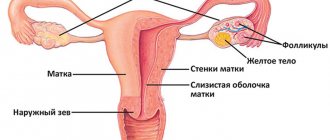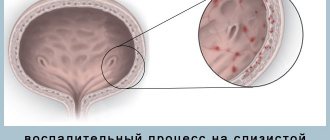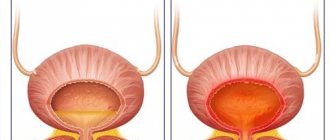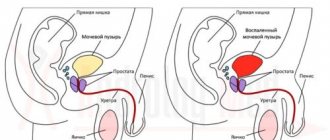Is there nausea with cystitis?
When nausea or vomiting occurs due to inflammation of the bladder, this raises suspicion. Immediately, questions swirl in my head as to whether the diagnosis was made correctly or, perhaps, it is worth undergoing additional diagnostic methods. Since cystitis is a disease of the urinary system, nausea should obviously not occur with it.
Causes
Can cystitis cause nausea? The answer from specialists on this issue will be positive, as it is explained by some factors that can provoke nausea during cystitis, and in some cases, vomiting:
- In parallel with inflammation of the bladder, an intestinal infection occurs. In this case, in addition to the symptoms of cystitis, there will be additional manifestations of damage to the gastrointestinal tract (GIT): diarrhea, abdominal pain, nausea, vomiting, dehydration.
- As is known, the main treatment for inflammation in the bladder is carried out with antibacterial drugs, which can cause side effects from the gastrointestinal tract in the form of nausea, vomiting, and stool disorders. Also, if treatment is carried out without supporting the intestines with means that normalize the microflora, intestinal dysbiosis can develop very quickly.
- Nausea with cystitis can occur during pregnancy with symptoms of toxicosis.
- Concomitant chronic diseases of the digestive system, which arise as a result of the inflammatory process in the body, can give such manifestations.
- Very often, cystitis, with insufficient treatment, turns into pyelonephritis, in which case the patient experiences nausea, vomiting, lumbar pain and elevated body temperature.
- The phenomena of intoxication, with inflammation of the bladder, appear when pathogenic microorganisms enter the blood and cause similar symptoms.
Having analyzed in detail in what cases nausea may occur with cystitis, it is worth noting that any changes in the human body due to inflammation of the bladder are of important diagnostic significance and require immediate consultation with a specialist. These symptoms, which are associated with cystitis, may indicate the development of dangerous conditions that require adjustment of the prescribed treatment.
Recommendations
What should a patient do if nausea occurs due to cystitis? If the diagnosis of cystitis is determined by a doctor, then it is necessary to undergo an additional consultation with a gastroenterologist and other diagnostic methods.
In cases where the diagnosis was made independently and the patient is self-medicating, nausea and vomiting appear, it is necessary to urgently consult a doctor for a correct diagnosis of the underlying disease.
If, on the eve of the onset of urinary disturbances, patients had unprotected sexual intercourse, we may be talking about the development of a sexually transmitted infection and it is necessary to consult a gynecologist and urologist.
If there are changes in your condition while taking an antibiotic, you must immediately notify your doctor and stop using the drug. The doctor selects an antibacterial substance from a different series to avoid side effects from the gastrointestinal tract.
Conclusion
Having examined in detail the issue of nausea with cystitis, we can conclude that this phenomenon indicates the development of some complication in the body and the patient needs to seek help from a specialist. You should not wait until the symptoms go away and self-medicate, as a delay in treatment leads to irreversible consequences.
Prevention
To prevent nausea with cystitis, you must:
- Drink a lot of water, more than 2 liters of water. This will prevent the spread of inflammation to the kidneys and reduce the intensity of negative manifestations;
- Take medications that protect microflora simultaneously with the use of antibacterial agents;
- Start treatment of the disease in a timely manner to avoid complications;
- In case of severe ailments, consult a doctor rather than self-medicate.
Nausea with cystitis indicates the parallel development of serious diseases or complications in other organs. Such symptoms require a prompt visit to the hospital to provide qualified medical care.
How to relieve attacks of nausea with cystitis?
The main symptom of cystitis is a frequent urge to urinate. Characteristic symptoms in some cases are complemented by quite specific ones, such as nausea that occurs with cystitis.
In general, cystitis is a female disease and is caused by inflammation of the bladder caused by various groups of bacteria. The development of cystitis can also be caused by disorders caused by injuries, infectious or autoimmune diseases, but this happens extremely rarely.
- Causes
- How to relieve an attack?
- Prevention
- Conclusion
What can cause nausea with cystitis and how to eliminate the unpleasant symptom?
Sometimes nausea occurs with cystitis. Let's figure out whether this could be the case, why this happens and what causes such symptoms. Perhaps this is just a misdiagnosis and you should see another doctor? There are several reasons for this phenomenon; we will dwell on each of them in more detail.
Cystitis is an inflammation of the mucous membranes of the bladder. Therefore, presumably nausea and cystitis are not related, since this disease does not affect the digestive tract. But in some cases there are enough factors contributing to just such an atypical manifestation of pathology.
Why does nausea occur with cystitis?
Experts identify the following main reasons associated with this unpleasant feeling and the urge to vomit during inflammation of the bladder:
- Intestinal infection simultaneously with the appearance of cystitis. It often happens that E. coli causes poisoning and gastrointestinal disease and quickly enters the nearby bladder, which provokes symptoms of cystitis. At the same time, characteristic symptoms are added - pain in the navel, diarrhea, etc.
- Taking medications, most often antibiotics. It is they that, when used incorrectly or as a result of decreased immunity, often cause dysbacteriosis. After taking such drugs, there may be a strong feeling of nausea and frequent vomiting.
- Pregnancy is accompanied by similar symptoms, especially in the first months. Sometimes toxicosis causes quite unpleasant sensations in women and girls and they attribute any ailment to this. But during such a delicate period, the risks and diseases of the bladder are high, so nausea with cystitis during pregnancy speaks not only of toxicosis.
- Concomitant diseases make themselves felt in the same way. This could be a cancerous tumor, or diseases of the liver, gall bladder, etc. Cystitis does not occur on its own; infection could be provoked by pathogenic microflora of a neighboring organ. Also, an advanced chronic form of inflammation of the bladder could lead to damage to other systems. The result is a layering of different symptoms that indicate a malfunction of these organs.
- Pyelonephritis is considered a more dangerous complication of cystitis and often occurs due to the lack of timely adequate treatment. This disease is accompanied not only by pain, but also by nausea, vomiting, fever, intoxication of the body, etc. If you do not consult a doctor with such symptoms, kidney failure may develop.
- Gynecological pathologies and sexually transmitted infections also cause symptoms of cystitis and are similar in their manifestations.
- General intoxication - in some forms of the disease (bacterial), pathogenic microorganisms quickly enter the blood and lymph flow and cause general symptoms of malaise. These include fever, weakness, nausea, vomiting, etc. The longer toxins accumulate in the body, the stronger these manifestations are.
Having learned why you feel sick with cystitis, you can assume that such a symptom in any case requires immediate consultation with a doctor for help. Self-medication and ignoring the disease are fraught with serious health consequences.
Concomitant pathologies
Very often, cystitis is confused with other problems in the body, and it is also a consequence of an advanced underlying disease. To determine whether cystitis itself can cause nausea and vomiting or whether it indicates something else, you need to assess your condition and note all the symptoms.
Sometimes people mistake a sexually transmitted infection for cystitis. Many of the signs may be similar, but if you have recently had unprotected contact, it is better to make sure that there are no more dangerous diseases. Moreover, they are often accompanied by itching, swelling, redness and burning in the pelvic area.
Since women are much more likely to experience cystitis due to the special location of the genital organs and bladder, they often confuse various gynecological problems that are accompanied by symptoms similar to cystitis.
The early stages of malignant tumors manifest themselves as inflammatory processes in various parts of the body. At the same time, immunity is greatly reduced and the body reacts with frequent disruptions in the functioning of internal systems, the temperature rises, and signs of general intoxication appear. Therefore, if there is nausea and vomiting with cystitis, it is better to make sure that this is not caused by oncology.
How to identify the problem?
Depending on the symptoms you experience, you need to see a doctor (general practitioner, urologist, gynecologist, nephrologist) and undergo certain diagnostic procedures. This is what will help establish a diagnosis and choose the most appropriate treatment regimen:
- For cystitis that is accompanied by nausea and vomiting, additional consultation with a gastroenterologist is required. He will help to conduct an examination and determine whether there is an intestinal infection in the body. If it is she who provoked the disease, then she will need to take certain medications aimed at eliminating it.
- If a woman is in the first months of pregnancy and she develops signs of cystitis, she should definitely consult her doctor to prevent the condition from worsening.
- In cases where nausea due to cystitis appears during treatment with antibiotics, this indicates the onset of dysbacteriosis. Therefore, you will need to replace the drug with a more gentle one, as well as take a course to restore the intestinal microflora.
- Since such atypical symptoms are more characteristic not of cystitis, but of other dangerous diseases of the urinary system, it is necessary to undergo a series of examinations and tests. This will help determine whether the kidneys and other organs are affected, which need to be treated a little differently than cystitis.
- Additional consultations with a gynecologist and urologist will help determine whether there are any concomitant diseases that appeared simultaneously with cystitis. In this case, doctors prescribe additional tests.
What to do?
According to the detected problems, you will have to act differently:
- in case of intoxication, it is necessary to take a lot of fluid to remove dangerous substances from the body, drink diuretics, and in extreme cases undergo a course of forced diuresis using intravenous infusions of medical solutions;
- if the disease has spread to the kidneys, then urgent hospitalization and an intensive course of appropriate therapy in combination with a strict salt-free diet are necessary;
- in case of dysbacteriosis, restoration of intestinal microflora is required;
- in cases where cystitis manifests itself simultaneously with gastrointestinal diseases, the doctor will prescribe a complex of anti-inflammatory drugs and diet;
- During pregnancy, self-medication is completely prohibited, so after consulting a gynecologist, you will have to go to the hospital and undergo therapy under the close supervision of doctors.
: nausea - causes, symptoms, sites of disease.
What should you know?
Cystitis in itself is a dangerous and unpleasant disease. But if it is also accompanied by symptoms such as vomiting and nausea, then you must definitely seek help from specialists in order to begin adequate treatment as early as possible. There are such nuances of the disease:
- Nausea occurs when body temperature rises. But with a mild form of cystitis, this should not happen at all, so such a symptom indicates a serious complication that cannot be ignored.
- When the disease enters the chronic stage, nausea may be a constant symptom, but treatment of cystitis in this phase takes much longer and is more difficult.
- With prolonged inflammation of the bladder, the kidneys are sooner or later affected, which is accompanied by nausea, vomiting and other symptoms. This condition quickly depletes the body and leads to a decrease in immunity.
Remember that with a mild initial form of cystitis there is no nausea. It is not a sign of this disease. Therefore, if such symptoms appear, you need to be examined as soon as possible and establish a complete picture of your health status.
Source: https://cistit911.ru/simptomy/toshnota-pri-cistite.html
Why nausea with cystitis: reasons for the body's reaction
Cystitis is a bacterial disease of the bladder that is inflammatory in nature. The pathology has characteristic symptoms and not entirely specific ones, such as nausea and vomiting.
Why does cystitis occur?
The reason that leads to the development of cystitis is infection of the bladder cavity.
These are bacteria that are specific to the urinary system, intestinal flora, sexually transmitted infections, Pseudomonas aeruginosa, staphylococci and streptococci.
In addition to the infectious factor, there are also traumatic, autoimmune, viral and dystrophic causes, but they are much less common.
Symptoms
A specific manifestation of cystitis is a combination of two syndromes. The first syndrome is dysuric, manifested in the form of urinary disorders.
Patients experience pain and painful urination. It is worth noting that they become much more frequent, but at the same time, the amount of urine excreted at a time decreases.
Depending on the cause of development, impurities of pus, blood, exfoliated epithelium, or necrotic fragments appear in the urine.
Second, intoxication syndrome is a manifestation of all inflammatory processes within the body.
It develops against the background of the fact that mediators (chemical substances similar to enzymes) of inflammation, as well as waste products of bacteria (with bacterial cystitis), enter the bloodstream.
Manifests itself in the form of increased body temperature, decreased activity, increased fatigue, decreased appetite, and body aches. Sometimes, cystitis is accompanied by nausea or vomiting.
Why does nausea occur with cystitis?
Some patients with cystitis complain of nausea or vomiting. It is worth understanding why nausea occurs with cystitis.
There are several reasons why this appears:
- Severe intoxication syndrome. Some bacterial cystitis, which is caused by bacteria, causes nausea and vomiting. This is due to the fact that bacteria are actively multiplying. This leads to the accumulation of toxins and metabolites inside the body. Circulating in the bloodstream, they have a negative effect on organs. The brain is most sensitive to the presence of toxins in the blood. The vomiting center is irritated, which leads to nausea and vomiting.
- Taking antibiotics. Antibacterial agents do not work selectively. They affect bacteria that are inside the body, including the intestinal microflora. As a result of this, dysbiosis develops, the symptom of which is vomiting or nausea.
- Intestinal diseases. If the loops of the small intestine are abnormally positioned, inflammation is transmitted to it from the bladder and vice versa. Then nausea will be accompanied by upset stool and pain in the navel area.
- Spread of the inflammatory process to the kidneys. If cystitis is complicated by pyelonephritis, it may be accompanied by symptoms of renal failure. In this case, nitrogen metabolism products accumulate inside the body, which have a toxic effect on the vomiting center. This condition is a harbinger of the development of uremic coma.
- Pregnancy. Sometimes, cystitis occurs in pregnant women. Then nausea and vomiting will be manifestations not of cystitis, but of gestosis in pregnant women.
What else is important to know
Note that the feeling of nausea during the inflammatory process in the urinary tract occurs only when the condition of the bladder has already become severe. Typically, mild cystitis (initial stage) has symptoms such as painful urination and burning in the intimate area during bowel movements.
An increase in temperature may be accompanied by vomiting
If nausea and vomiting occur, this may be due to an increase in body temperature. As a rule, the temperature cannot rise during inflammation on its own, which means that something else has become inflamed somewhere in the body.
It is also worth knowing that nausea and vomiting with cystitis can only occur if the pathology is already permanent. Therefore, you may feel sick with cystitis if it has reached the chronic stage. This is explained by the fact that harmful bacteria move through the lymphatic system to the kidneys and cause inflammation in them.
If you have chronic bladder inflammation, you should listen carefully to the signals, since a “missed” symptom may be a sign of serious inflammation in the body.








